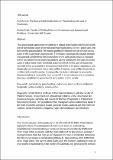Files in this item
The role of civil society actors in peacemaking : the case of Guatemala
Item metadata
| dc.contributor.author | Brett, Roddy | |
| dc.date.accessioned | 2018-10-23T23:47:48Z | |
| dc.date.available | 2018-10-23T23:47:48Z | |
| dc.date.issued | 2017-04-24 | |
| dc.identifier | 250067880 | |
| dc.identifier | dfb1ad35-09e2-46d9-901a-348eba3434b1 | |
| dc.identifier | 85018798369 | |
| dc.identifier.citation | Brett , R 2017 , ' The role of civil society actors in peacemaking : the case of Guatemala ' , Journal of Peacebuilding and Development , vol. 12 , no. 1 , pp. 49-64 . https://doi.org/10.1080/15423166.2017.1281756 | en |
| dc.identifier.issn | 1542-3166 | |
| dc.identifier.other | Bibtex: urn:2b8e93ec582185970078ce387d7cfd90 | |
| dc.identifier.uri | https://hdl.handle.net/10023/16304 | |
| dc.description.abstract | This article builds upon recent scholarship in critical peace studies that focuses on the role of civil society actors in formal peacemaking processes, in short, peace talks, and post-conflict peacebuilding. The article specifically explores the role of civil society actors in the Guatemalan peace process. The research addresses the possible tensions and potential complementarities in processes where civil society enjoys a mandated role in centralised, formal peace negotiations carried out between the state and armed actors in talks levied within the liberal peace framework. In the case of Guatemala, non-state actors participated to an unprecedented extent in the peace negotiations, and Guatemala has not relapsed into armed conflict. However, post-conflict Guatemala is a violent and unstable country. Consequently, the study challenges the assumption that peacemaking is necessarily more successful in those instances where provisions have been established to guarantee the participation of civil society. | |
| dc.format.extent | 16 | |
| dc.format.extent | 105907 | |
| dc.language.iso | eng | |
| dc.relation.ispartof | Journal of Peacebuilding and Development | en |
| dc.rights | Copyright © 2017, Routledge. This work is made available online in accordance with the publisher’s policies. This is the author created, accepted version manuscript following peer review and may differ slightly from the final published version. The final published version of this work is available at https://doi.org/10.1080/15423166.2017.1281756 | en |
| dc.subject | Peacemaking | en |
| dc.subject | Peacebuilding | en |
| dc.subject | Civil society actors | en |
| dc.subject | Inclusive settlement | en |
| dc.subject | Guatemala | en |
| dc.subject | Political violence | en |
| dc.subject | Armed conflict | en |
| dc.subject | JZ International relations | en |
| dc.subject | T-NDAS | en |
| dc.subject | SDG 16 - Peace, Justice and Strong Institutions | en |
| dc.subject.lcc | JZ | en |
| dc.title | The role of civil society actors in peacemaking : the case of Guatemala | en |
| dc.type | Journal article | en |
| dc.contributor.institution | University of St Andrews.School of International Relations | en |
| dc.contributor.institution | University of St Andrews.The Handa Centre for the Study of Terrorism and Political Violence | en |
| dc.identifier.doi | 10.1080/15423166.2017.1281756 | |
| dc.description.status | Peer reviewed | en |
| dc.date.embargoedUntil | 2018-10-24 |
This item appears in the following Collection(s)
Items in the St Andrews Research Repository are protected by copyright, with all rights reserved, unless otherwise indicated.

